Billions Spent Luring Illegal Immigrants
Investigation: Feds Spent $20 Billion On Migrant Refugee Assistance
An all-time high in illegal entrants at the border creates all-time surge in taxpayer costs.
The U.S. border patrol made 2.5 million migrant encounters at the U.S.-Mexico border in fiscal year 2023, an all-time high.
There seems to be no end in sight, or meaningful plan from the Biden administration to stop or slow the number of people coming over the border. Meanwhile, federal funds flowing to migrants are growing at an exponential rate.
Our auditors at OpenTheBooks.com looked at just one federal office to get an idea of how much spending is going towards accommodating, transporting, and providing migrants with various other services.
The Office of Refugee Resettlement (ORR), a part of Health and Human Services, is a major vehicle for migrant-related spending. Congress appropriated $20 billion in just two years on “refugee and entrant assistance.”
Background
Last year, we published an oversight report on the unaccompanied children program run by the agency: up to 85,000 minors were lost after “sponsorship” with a “vetted” guardian. The New York Times found credible allegations of child labor law violations and congressional whistleblowers detailed large-scale child trafficking.
Now, our investigation into the agency reveals new oversight: 1. billion-dollar spending spikes in the adult refugee programs; and 2. potential conflicts-of-interest between agency leadership and its largest grant recipients. In fact, for decades, agency director Robin Dunn Marcos was employed in executive positions by two non-profit organizations that are among the agency’s largest grantees.
Here is a five minute interview describing the big issues in our reporting:
$20 Billion For Refugee Care (2022-2023)
Refugee and entrant assistance totaled a stunning $20 billion over the last two fiscal years. The costs rose from $8.925 billion (FY2022) to $10.928 billion (FY 2023).
Across all programs, the Administration of Children and Families (ORR’s parent agency) received funding of $2.94 billion in Afghanistan Supplemental Appropriation and additional supplementals just in fiscal year FY2022 (P.L. 117-43 and P.L. 117-70). Ukrainian refugees cost taxpayers $900 million in FY2022 and $1.775 billion in FY2023 (P.L. 117-128 and P.L. 117-180).
In its latest Congressional Budget Justification, the agency suggested expanding its mandate still further by providing more services to a broader range of applicants, advocating that:
- “Special Immigrant Juvenile Minors” within the “Unaccompanied Refugee Minor” program access the same benefits as refugees, which include access to Medicaid and the same foster care services as American children.
- Legal assistance to Ukrainian and Afghan children and other URM-designated youth to legal assistance ensuring permanent residency.
- Cash assistance to full-time college or technical school students for refugees.
- Removing the need for refugees to obtain economic self-sufficiency “as quickly as possible.”
All aspects of programmatic activities—from who is eligible to how much is spent—is authorized by Congress.
An Explosion In Funding For Refugee And Entrant Assistance Discretionary Grants
The Refugee and Entrant Assistance Grants are just one of many refugee-focused programs offered by the Administration for Children and Families.
These grants are intended to serve those with the following legal status: asylees, refugees, survivors of torture, victims of trafficking, special immigrant visa holders (such as those from the Afghanistan Operation Allies Welcome) and entrants from Cuba and Haiti.
The grants cover a wide variety of programs, such as the Individual Development Accounts program, which helps eligible people save for asset purchases like a car or a house, and the Refugee Microenterprise Development program, which helps qualified people build credit through business and personal loans.
From 2013-2023, ORR doled out over $1.5 billion in grants under the Discretionary Grants category. But much of this spending occurred in 2022 and 2023.
Between 2021 and 2022 grant spending went from $33 million to over $400 million. In 2023 this spending was $615,601,449.
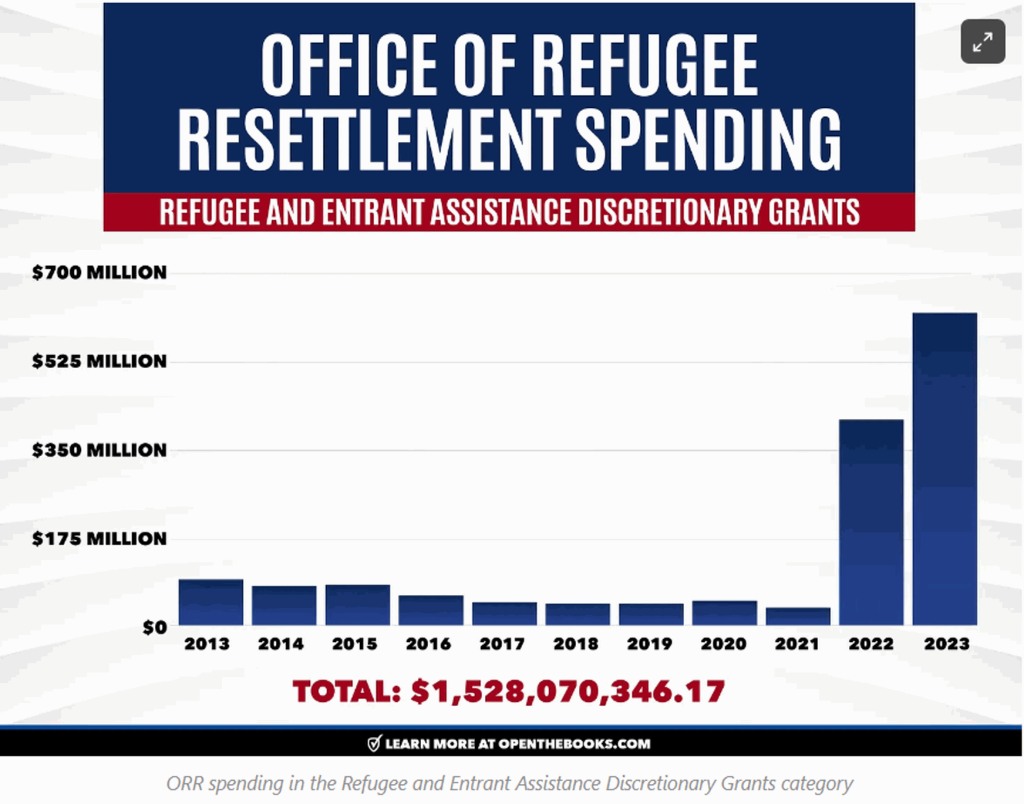
The “Preferred Communities Program” within the Refugee and Entrant Assistance category accounted for over half of all spending for this category in 2022: $275,949,105. In 2023 that spending was up to $436,247,481.
These funds were split between just seven organizations.
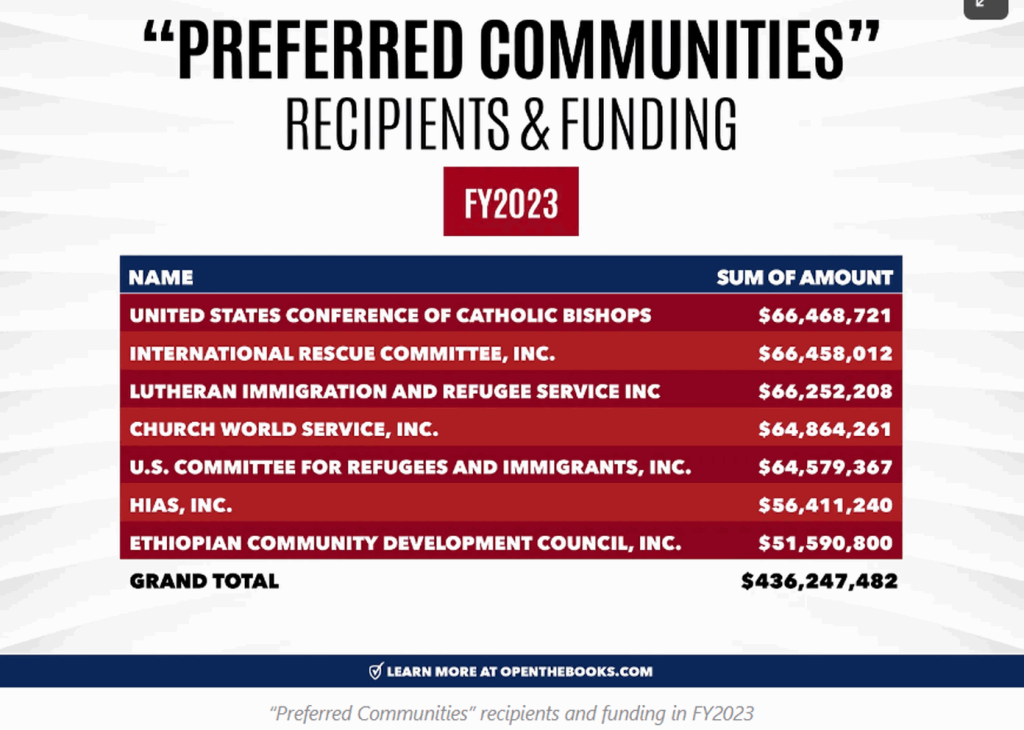
A summary of the benefits of ORR’s Preferred Communities Program reads: “offers intensive case management to overcome barriers” to “extremely vulnerable individuals.”
One grantee lists the program’s benefits:
- Emergency housing support (if necessary)
- Work authorization application
- Public benefits application
- Medical screening
- School enrollment
- Referrals to employment programs
- Cultural orientation
- Mental health referrals
- Legal assistance referrals
New Director From Big Grantee Organization
Robin Dunn Marcos joined the agency as director of the Office of Refugee Resettlement in September 2022 with a base salary of $180,000.
Dunn Marcos came to ORR after eight years with the International Rescue Committee (IRC) rising to their Senior Director for Resettlement, Asylum, and Integration.
Previously, Dunn Marcos served as executive director of the International Rescue Committee Phoenix branch for fifteen years, for a total of 23 years with the nonprofit. She spent four years at Church World Service between her IRC stints.
Both IRC and Church World Service have been some of biggest recipients of Refugee and Entrant Assistance Discretionary Grants over the years.
From FY 2013-2023 IRC received over $180 million in these grants from ORR, and Church World Service received nearly $125 million.
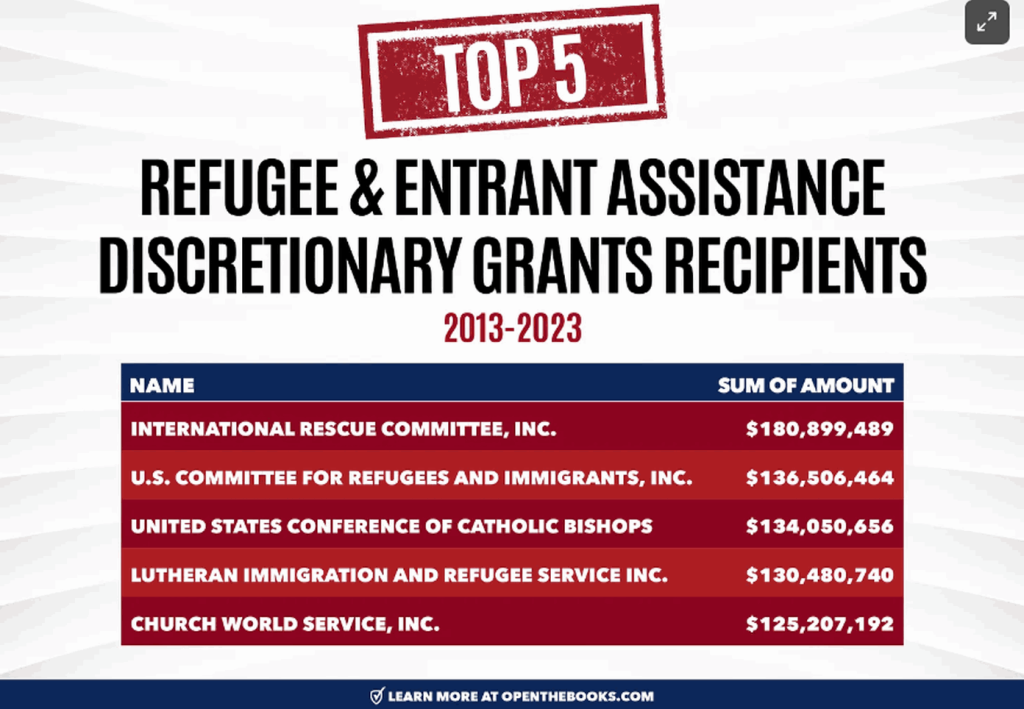
IRC is a huge international nonprofit, collecting over $924 million in contributions and grants in 2020, according to tax documents.
That same year IRC executive director David Miliband earned a salary of over $1 million. (Interns, however, are never paid.)
IRC provides several services related to ORR’s mission. In 2020 the organization claimed to have served 45,000 individuals in the United States with food, shelter, English classes, and legal advice.
In 2023, IRC received funding for the first time from ORR’s Unaccompanied Children program: $13,005,424 for “home studies and post-release services”
But even before then, the nonprofit worked in some capacity with unaccompanied children.
According to one article “IRC Los Angeles…[provides] assistance with school enrollment, acquiring state medical insurance, and obtaining pro bono legal services from local partner organizations.”
As spending at ORR swelled to new heights, IRC benefitted handsomely. The organization received over $235 million in spending in FY 2023 compared to $22 million in FY 2021.
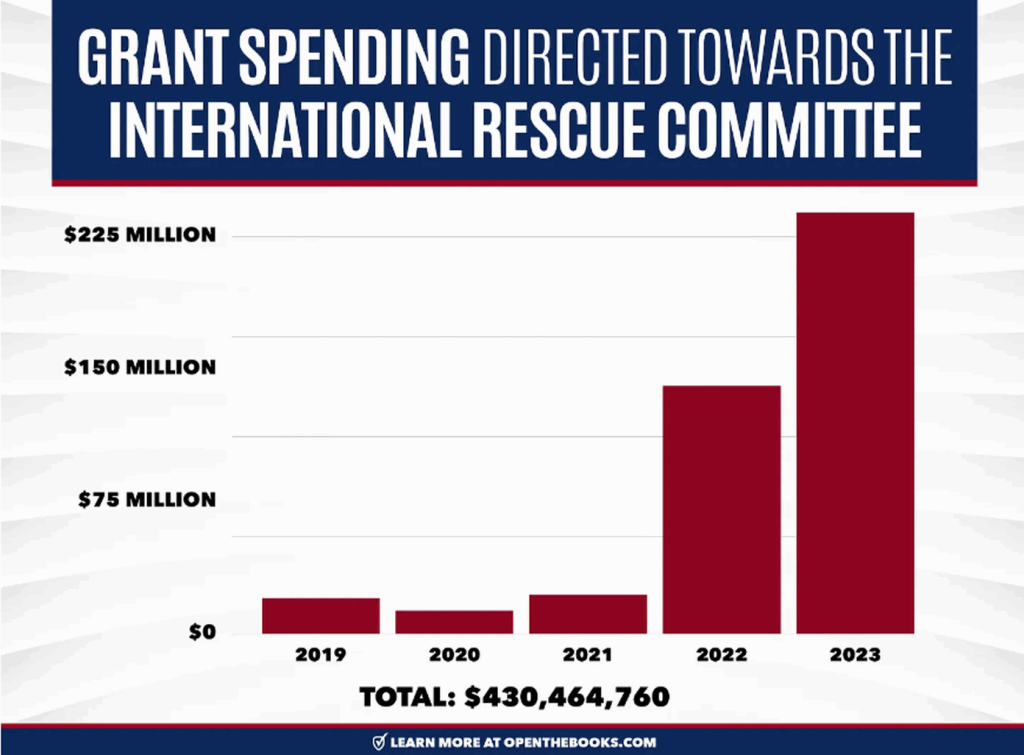
When reached for comment, a spokesperson for ORR said:
“Consistent with the Ethics Pledge, Robin Dunn Marcos is recused from participating in particular matters involving specific parties in which IRC is or represents a party. That recusal obligation lasts for two years from her date of appointment, which was September 11, 2022.”
Our auditors filed a Freedom of Information Act request for emails between Dunn Marcos and IRC officials in May 2023. We have not yet received a response.
When reached for comment, a spokesperson for ORR said:
“Consistent with the Ethics Pledge, Robin Dunn Marcos is recused from participating in particular matters involving specific parties in which IRC is or represents a party. That recusal obligation lasts for two years from her date of appointment, which was September 11, 2022.”
Our auditors filed a Freedom of Information Act request for emails between Dunn Marcos and IRC officials in May 2023. We have not yet received a response.
In April 2023 Dunn Marcos came under fire during a Congressional hearing regarding the 85,000 children the agency placed that are now unreachable, as reported in the New York Times.
During questioning Dunn Marcos said she did not believe the sponsor vetting system was inadequate and would not state whether the 85,000 number is accurate. She also did not know what the rejection rate of sponsorship applications is.
In June 2023 the HHS released an audit of ORR to investigate these and other allegations. The HHS found ORR went “above and beyond” its statutory requirements, although stated ORR would launch several initiatives to “enhance ORR services and supports,” such as a new “Program Accountability Team.”
By The Numbers
As reported by the Administration for Children and Families in their Fiscal Year 2024 Budget Justification, the number of people entering the U.S. under the ORR’s purview has increased tremendously in 2022, particularly under the category “Cuban and Haitian entrants” and “Unaccompanied Children.”
“Afghan Humanitarian Parolees” is a new category created after the U.S. ceded Afghanistan to the Taliban in 2021
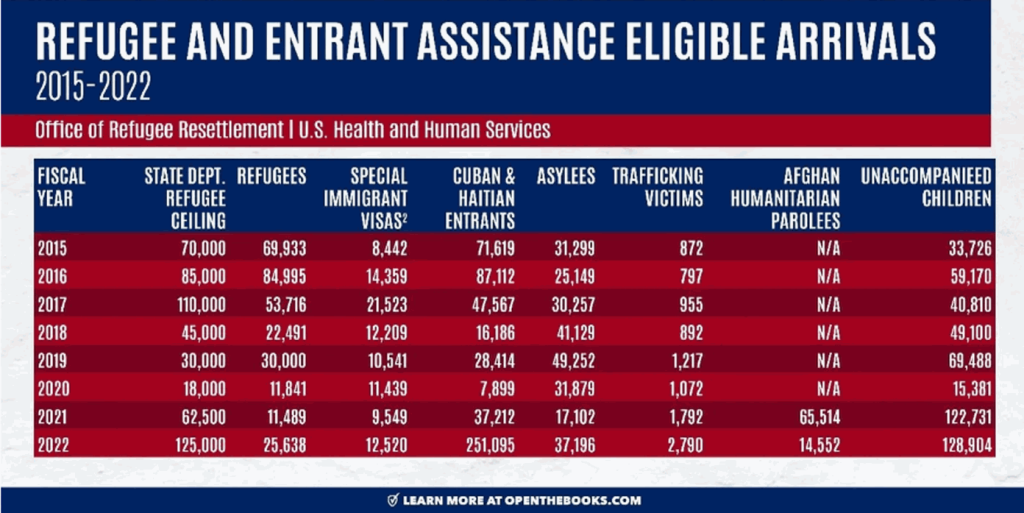
Critical Quote
Roger Severino, former HHS director of the Office of Civil Rights, wrote in a recent report:
“HHS and ORR have forgotten their original refugee-resettlement mission and instead have provided a panoply of free programs that incentivize people to come to the U.S. illegally.”
Conclusion
The Office of Refugee Resettlement is just one office in one agency, and this report focused primarily on just a few major grant programs within the office. The universe of taxpayer spending is so much larger, especially when including state and local funds as well.
As funding, mandates, and the overall number of entrants—legal and illegal—increases dramatically, American citizens and lawmakers would be wise to examine the web of incentives between the agency, nonprofit contractors, and the individuals eligible for these programs.

